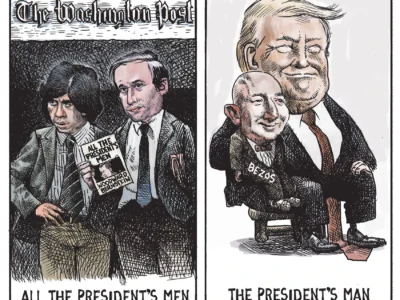A Letter to My Fellow Boomers About Climate Change
We have met the enemy and he is us.
Polls show that a great many members of our generation oppose taking action against climate change. I want to try to explain to that group why you should rethink your views. Let me start by explaining why climate action would benefit you yourself and then widen the focus to include your grandchildren and their kids.
Efforts to cut climate change right now aren’t likely to have a big effect on climate in the next decade or two. But there are more immediate benefits from cutting carbon because doing so will inevitably reduce other kinds of air pollutants. Increasing energy efficiency will cut electricity bills, and stricter fuel efficiency standards will cut gas bills, so these measures pretty much pay for themselves. Moreover, a side effect of cutting carbon is reducing air pollution, which is especially important for people in our age group. When it issued Obama’s Clean Power Plan, EPA estimated it would prevent up to 3,600 premature deaths and 1,700 non-fatal heart attacks annually. It’s people our age who are most at risk from heart attacks, strokes, and respiratory deaths. So the benefits to us are considerable.
What about the extra cost of electricity? Power bills were expected to go up by less than 3% in the short run and then come down in the long run, so not much to worry about there. In fact, renewable energy prices have gone down since 2015 when the Clean Power Plan was issued, and so has the cost of reducing carbon emissions.
Looking beyond our own welfare, what about our families? Suppose you have a grandchild or great-grandchild born next year. The odds are very good that they will live through the end of the century, even without any huge improvements in medical care. The decisions we make today about climate change will impact them throughout their lifetimes. Think about two scenarios – one where we take climate action, but well short of the Green New Deal, and the other where we just let present trends continue. By 2050, when the baby is thirty, our choice between those policies will start to make a difference, adding a couple of extra inches of sea level rise and another 1 ½ degree of warming if we let current trends continue. But when today’s baby is a grandparent or great-grandparent nearer the end of the century, the difference will be much starker. In the Bay Area, sea level will be up by four feet. Big droughts will come three times as often, and average annual temperatures will be up almost nine degree Fahrenheit, which translates to four to six times as many deaths from heat waves. Even under the lower emission scenario, climate change will have gotten worse since 2050, but not to nearly the same extent. Differences will grow even greater in the following years, as further generations of your family experience the impacts of climate change.
Some of the effects of climate change are more subtle. The impacts are bad enough in a place like the U.S., which has plenty of resources to deal with it. Those impacts – droughts, floods, heat waves, and rising seas – will hit a lot of places even harder. That includes parts of the world that are already flashpoints and will be further destabilized by climate change. In the meantime, climate change will also cause operational problems for our military. Those are the reasons why climate change is often described as a national security threat – something else that could impact your family now and going forward.
The upshot is that cutting carbon emissions now really matters in terms of the kind of legacy we leave behind. And efforts to cut carbon can also pay real health dividends in our own lifetimes.
Before closing, I should say something brief about a couple of questions that may be troubling you. First, is this climate change stuff real or just an intellectual fad? I was a little worried about that myself when I started working on the issue. I did some digging into the science and soon became convinced that the scientific evidence was very real. And second, won’t addressing climate change involve some kind of socialism? On that one, the answer is simply no. A carbon tax, for instance, would be no more socialist than today’s liquor or cigarette taxes.
I know I’m not likely to turn your thinking completely around in a short column. But give it some serious thought, won’t you?
Reader Comments
3 Replies to “A Letter to My Fellow Boomers About Climate Change”
Comments are closed.







Your quote of Pogo’s statement: “WE HAVE MET THE ENEMY AND HE IS US” was headlined at the first Earth Day in 1970.
Tragically, your concluding admission: “I know I’m not likely to turn your thinking completely around in a short column” proves Pogo is still right, half a century later.
I ask you and your colleagues, why are all you scholars at Legal Planet, some of the best and brightest in the world, failing so catastrophically to inform, educate and motivate the public to save our civilization?
Prof. Farber, once again, you and your colleagues are proving continuously that historians Will and Ariel Durant are still correct when they concluded, after 40 years of research, that it is the failures of politicians and intellectuals to meet the challenges of change that destroy civilizations.
The climate is changing but to think we know precisely when the magical point of no return occurs given the complexity of the earth’s climate is the height of hubris.
I studied geology in college. We know the average interglacial period lasts 30,000 to 100,000 years. We also know the last ice age ended 10,000 years ago. Without any human contributions, the Earth faces at least another 20,000 years of warming. All humans are doing is accelerating the inevitable.
Rather than saddle our children and grandchildren with the costs of trying to stop an irrestible force, we’re better off focusing on adaptation.
Humanity descended from the trees and evolved during a particularly sweet spot in the Earth’s 4.6 billion history. We need to adapt to the changing climate..